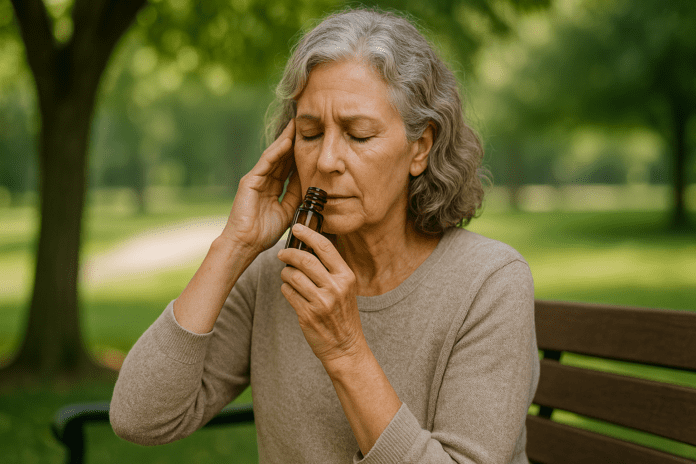In an increasingly fast-paced world, the search for natural tools to sustain mental clarity, sharpen attention, and enhance brain performance has become more than a wellness trend—it’s a necessity. This is especially true for adults aiming to preserve cognitive vitality as they age. Among the many approaches gaining attention, essential oils have emerged as a powerful yet gentle support for mental alertness and longevity. These plant-derived compounds have long been valued in holistic medicine, but their potential for enhancing concentration and boosting energy through the practice of aromatherapy is now being explored in more scientific detail. From their chemical properties to their neuroprotective effects, energizing essential oils are proving to be more than just fragrant remedies.
You may also like: How to Improve Focus at Work Naturally: Science-Backed Techniques to Boost Mental Clarity and Long-Term Brain Health
As we unpack the evidence behind essential oils for energy and focus, we’ll explore how specific oils interact with the brain, stimulate neurotransmitters, and contribute to long-term cognitive health. We’ll also delve into practical strategies for incorporating aromatherapy oils for energy into daily routines, particularly for those navigating age-related cognitive changes. This comprehensive guide blends traditional wisdom with emerging research, offering a science-backed yet approachable look into how essential oils can play a meaningful role in optimizing brain performance and preserving mental acuity over time.
Understanding the Science Behind Aromatherapy and Brain Function
The practice of aromatherapy, which involves the therapeutic use of plant-derived essential oils, has a profound impact on the brain. When inhaled, the aromatic compounds in these oils activate the olfactory system, directly influencing the limbic system—the area of the brain associated with emotions, memory, and behavior. This neurological pathway explains why certain scents can evoke strong emotional responses or memories. More importantly, it also clarifies how specific essential oils for focus and energy can trigger neurochemical reactions that enhance cognitive performance.
Limonene, pinene, and eucalyptol are examples of active compounds found in many energizing essential oils. These constituents have been shown in laboratory studies to stimulate the central nervous system, enhance alertness, and even reduce mental fatigue. Some of these aromatic molecules may also influence neurotransmitters such as dopamine and acetylcholine, which are crucial for focus, attention, and memory formation. This emerging body of research supports the idea that essential oils are not merely pleasant scents but are bioactive substances with the potential to affect brain function.
In addition to their stimulating effects, many aromatherapy oils for concentration also possess antioxidant and anti-inflammatory properties. Chronic inflammation and oxidative stress are two key contributors to age-related cognitive decline, including conditions like mild cognitive impairment and even Alzheimer’s disease. By mitigating these processes, certain essential oils may offer neuroprotective benefits that help preserve brain health over the long term. This dual action—enhancing immediate mental clarity while also supporting long-term neural integrity—makes essential oils a uniquely versatile tool in cognitive wellness.
Energizing Essential Oils That Enhance Focus and Attention
Several essential oils stand out for their ability to boost mental energy and improve concentration. Peppermint oil, for instance, is one of the most well-studied oils for enhancing alertness and cognitive performance. The active ingredient menthol stimulates the trigeminal nerve, producing a sensation of coolness that can improve mental clarity and wakefulness. Research has demonstrated that inhaling peppermint oil may lead to improved reaction times, enhanced memory recall, and greater task performance.
Rosemary essential oil is another powerful contender among essential oils for concentration. Rich in 1,8-cineole, rosemary has been linked to improvements in working memory and cognitive speed. Inhalation of rosemary has been shown to enhance information processing and boost mental alertness, making it particularly useful for students, professionals, or older adults looking to stay mentally sharp.
Citrus oils such as lemon, orange, and grapefruit are also effective aromatherapy oils for energy. These oils contain limonene, a compound known to elevate mood and reduce fatigue. Studies suggest that citrus oils can promote feelings of vitality and well-being while also enhancing focus and motivation. These benefits are particularly valuable for aging individuals experiencing dips in mood or mental energy, as they provide a natural and uplifting cognitive boost without the side effects associated with stimulants.
Basil, eucalyptus, and frankincense are additional, energetic essential oils worth noting. Basil is often used for mental fatigue and burnout, while eucalyptus offers invigorating properties that can help counteract mental sluggishness. Frankincense, although more commonly associated with relaxation and meditation, also supports clarity and cognitive balance, especially when blended with more overtly energizing aromatherapy oils. Together, these oils can be part of a well-rounded toolkit for enhancing mental function naturally.

The Role of Essential Oils in Supporting Brain Health as You Age
As we grow older, it’s natural for our cognitive faculties to change. Age-related memory lapses, slower information processing, and reduced mental stamina are common experiences that can affect quality of life. However, emerging evidence suggests that lifestyle choices—including diet, physical activity, sleep, and stress management—play a significant role in determining how gracefully our brains age. Within this framework, essential oils for attention and focus may serve as complementary tools for supporting cognitive resilience.
One of the most compelling reasons to incorporate essential oils into an aging brain health strategy is their ability to address both acute and chronic contributors to cognitive decline. For example, stress is a well-known accelerant of neurodegeneration, and certain aromatherapy oils for focus like lavender or bergamot, can modulate cortisol levels and promote relaxation. While these are not traditionally categorized as energizing essential oils; their calming effects can indirectly support focus by reducing mental clutter and anxiety.
Inflammation is another critical factor in neurodegeneration, and many essential oils possess anti-inflammatory compounds. Rosemary, frankincense, and turmeric essential oils have shown promise in reducing inflammatory markers associated with cognitive decline. Regular use of these oils, whether through inhalation or topical application, may help protect brain cells and slow down age-related changes in brain structure and function.
Moreover, essential oils for concentration and energy may promote neuroplasticity—the brain’s ability to adapt, grow, and form new connections. Some oils, such as lemon balm and clary sage, have demonstrated the ability to influence neurotrophic factors that support brain cell regeneration. This makes them particularly valuable not only for sustaining current cognitive function but also for fostering long-term brain vitality.
Best Practices for Using Aromatherapy Oils for Energy and Focus
Incorporating essential oils into a daily routine can be both simple and highly personalized. Inhalation remains the most direct and effective method for stimulating the brain, as it allows the active compounds to reach the limbic system. Diffusers are a popular option for dispersing oils into the environment, creating an energizing and focus-enhancing atmosphere. Alternatively, applying a few drops of essential oil to a tissue or cotton ball and placing it near your workspace can provide targeted stimulation without overwhelming the senses.
Topical application is another effective method, particularly when combined with carrier oils like coconut or jojoba. Applying essential oils to pulse points such as the temples, wrists, or the back of the neck allows for localized absorption while also offering aromatic benefits. When used mindfully, essential oils for energy and focus can become a part of your pre-work ritual, meditation practice, or even a midday pick-me-up during long meetings or study sessions.
Blending oils is another powerful strategy for maximizing benefits. For example, combining peppermint and rosemary can create a synergistic effect that enhances both alertness and memory. Pairing citrus oils with grounding oils like frankincense or cedarwood can offer both stimulation and balance, preventing the jitteriness that sometimes accompanies overly stimulating scents. By experimenting with different combinations, users can tailor their aromatherapy experience to their unique cognitive needs and preferences.
It’s important to use high-quality, pure essential oils to ensure safety and efficacy. Synthetic fragrances or diluted oils may not offer the same therapeutic effects and can even cause adverse reactions. Always check for third-party testing or certifications, and when in doubt, consult with a qualified aromatherapist or integrative healthcare provider. This level of care supports the EEAT principles of experience, expertise, authoritativeness, and trustworthiness in health content and personal wellness practices.
Integrating Essential Oils into a Holistic Brain Health Lifestyle
While essential oils offer compelling benefits, they are most effective when used as part of a broader lifestyle strategy. Combining aromatherapy with other brain-healthy habits can significantly amplify its impact. Nutrition, for instance, plays a crucial role in brain function, and diets rich in omega-3 fatty acids, antioxidants, and phytonutrients provide the raw materials for cognitive maintenance. Using aromatherapy oils for concentration during meals or meal prep can create a sensory cue that enhances mindfulness and digestion, both of which support brain health.
Exercise is another pillar of cognitive longevity, and essential oils can serve as motivational tools in this context. Energizing essential oils like grapefruit or eucalyptus can be used before a workout to boost mental energy and focus, making it easier to stay committed to regular movement. Post-exercise, oils with anti-inflammatory properties can help the body recover, reducing physical and mental fatigue that might otherwise derail cognitive efforts later in the day.
Sleep, often overlooked in cognitive health discussions, is also deeply affected by aromatherapy. While this article focuses primarily on energizing aromatherapy oils, it’s worth noting that oils like lavender and chamomile play an essential counterbalancing role. Quality sleep supports memory consolidation, emotional regulation, and brain detoxification processes. Using the right oils at the right time—invigorating during the day and calming in the evening—creates a natural rhythm that promotes sustained mental clarity and resilience.
Social connection and lifelong learning are also key contributors to brain health. Engaging with others and continuing to challenge the brain through new experiences and knowledge keeps neural circuits active. Incorporating essential oils for attention and focus during these interactions can help maintain engagement and mental presence. For example, diffusing rosemary or lemon oil during book clubs, educational courses, or conversations can subtly enhance cognitive performance and enjoyment.

Why Essential Oils Deserve a Place in Your Cognitive Wellness Plan
There is a growing body of evidence that supports the use of essential oils for energy and focus, not only for short-term mental performance but also for long-term brain health. These natural substances offer a gentle yet effective way to support attention, memory, and overall cognitive function, particularly as we age. Unlike pharmaceutical stimulants, which often come with side effects or tolerance issues, essential oils provide a low-risk alternative or complementary strategy for enhancing mental clarity.
One of the most compelling aspects of aromatherapy is its adaptability. Whether you’re navigating a high-pressure workday, managing the brain fog that can accompany perimenopause or andropause, or simply trying to stay sharp in your later years, there is likely a combination of essential oils that can support your goals. With mindful integration and consistent use, essential oils can become a reliable ally in the pursuit of mental vitality and graceful aging.
Furthermore, the use of essential oils encourages greater self-awareness and intentionality. The act of pausing to inhale an invigorating scent or apply a focus-enhancing blend creates moments of mindfulness that can counteract the mental fragmentation of modern life. These small rituals accumulate over time, reinforcing healthy cognitive patterns and fostering a sense of empowerment in managing your own brain health
Frequently Asked Questions: How Energizing Essential Oils Can Naturally Support Focus, Attention, and Brain Health as You Age
1. Can essential oils be used as an alternative to caffeine for boosting mental energy?
Yes, essential oils for energy and focus can offer a compelling alternative to caffeine, especially for individuals sensitive to stimulants. Unlike caffeine, which directly affects the central nervous system and may lead to dependency or withdrawal symptoms, essential oils for energy work through the olfactory system, gently stimulating alertness and mental clarity without jitteriness. Peppermint and rosemary are two examples of energizing essential oils that help wake up the brain naturally through their active constituents like menthol and cineole. When used in aromatherapy or topical blends, these oils can support cognitive function, sustain energy levels, and improve mood throughout the day. For those who experience crashes after consuming coffee or energy drinks, switching to aromatherapy oils for energy may provide a smoother, more balanced form of stimulation.
2. How can I incorporate essential oils for attention and focus into a professional work environment discreetly?
Using essential oils in a shared or professional environment requires subtlety, but it can be done effectively. Personal aromatherapy inhalers are one discreet option—these portable devices allow you to experience the benefits of essential oils for focus without diffusing scents into communal spaces. Another practical method is applying diluted oils to pulse points like the wrists or collarbone, which offers localized benefits without overwhelming coworkers. Opt for light, uplifting scents like lemon or basil, which are less likely to be perceived as intrusive. Additionally, some people use aromatherapy oils for focus by placing a drop on a cotton ball inside a locket-style diffuser necklace. These subtle techniques allow individuals to access the cognitive benefits of energizing aromatherapy oils while maintaining workplace etiquette.
3. Are there long-term cognitive benefits associated with using essential oils for concentration?
While many people associate essential oils for concentration with short-term alertness, research suggests potential long-term benefits when used consistently. Certain essential oils contain neuroprotective compounds that may help reduce oxidative stress, support synaptic plasticity, and regulate inflammatory pathways associated with cognitive decline. Rosemary, for instance, is not only an energetic essential oil but also rich in antioxidants that may safeguard brain cells from aging-related damage. Regular use of aromatherapy oils for concentration could help support mental resilience over time, particularly when combined with other healthy lifestyle practices such as a nutrient-dense diet and regular cognitive stimulation. Though more longitudinal studies are needed, early findings indicate that essential oils for energy and focus may be a valuable part of a long-term cognitive wellness plan.
4. Can I use energizing essential oils during physical activity to boost mental stamina?
Absolutely, integrating energizing essential oils into your physical activity routine can enhance both mental and physical stamina. Oils like eucalyptus and grapefruit are known for their invigorating properties and can be applied topically or diffused before a workout to create a sense of motivation and mental clarity. Inhalation of aromatherapy oils for energy during low-intensity cardio sessions, such as walking or yoga, may improve focus and prolong engagement. You can also blend essential oils for focus with carrier oils and apply them to the chest or temples before exercise to support both breath control and mental alertness. This approach is particularly beneficial for individuals seeking a holistic method to sustain energy without relying on pre-workout supplements or stimulants.
5. How do essential oils interact with emotions to influence concentration and focus?
Essential oils for attention and focus often work by influencing the limbic system, the brain region responsible for emotions and memory. Emotional states such as anxiety, frustration, or boredom can significantly impair concentration, but aromatherapy oils for focus can help modulate these feelings. Uplifting scents like bergamot and orange can elevate mood, while grounding oils such as vetiver help reduce mental noise, thereby creating an emotional environment conducive to focus. This emotional regulation plays a vital role in how energizing essential oils enhance mental clarity. By shifting the emotional tone of a room or an individual, essential oils for concentration create the psychological space needed for productive thought and sustained attention.
6. What is the best time of day to use essential oils for energy and focus?
The ideal time to use essential oils for energy and focus depends on your daily rhythms and cognitive demands. Morning is often the most effective time for energizing essential oils, particularly those like peppermint or lemon that can stimulate the senses and help transition from sleep inertia to alertness. Midday slumps, commonly occurring between 1 p.m. and 3 p.m., are another strategic opportunity to use aromatherapy oils for concentration to combat fatigue and restore productivity. Evening use is typically reserved for more calming blends unless you need a final burst of mental energy for tasks like studying or creative work. Timing essential oils for energy to align with natural energy dips can significantly enhance their effectiveness while preserving your body’s internal balance.
7. Are there any specific safety guidelines for older adults using aromatherapy oils for concentration?
Older adults may benefit greatly from essential oils for focus and concentration, but safety is paramount due to changes in skin sensitivity, metabolism, and potential interactions with medications. Always dilute essential oils before topical use, using a 1% dilution ratio or less to minimize irritation. It is advisable to perform a patch test and to avoid ingesting oils unless under the supervision of a certified practitioner. Some essential oils, like rosemary and eucalyptus, may not be suitable for individuals with high blood pressure or epilepsy, so consulting with a healthcare provider is essential. Nevertheless, with appropriate use, aromatic practices involving essential oils for energy and focus can support cognitive aging while remaining both gentle and effective.
8. Can essential oils support children or teens with focus-related challenges like ADHD?
Emerging research and anecdotal reports suggest that essential oils for attention and focus may support children and teens facing focus-related challenges, including symptoms associated with ADHD. Oils such as vetiver, cedarwood, and lavender have been studied for their calming and focusing properties, while citrus oils offer gentle stimulation without overstimulation. However, it’s crucial to use child-safe dilutions and avoid potentially irritating oils like peppermint in younger children. Incorporating aromatherapy oils for concentration into routines like homework time or classroom study may help regulate mood and promote sustained engagement. While not a substitute for medical treatment, these natural tools can serve as supportive measures in broader therapeutic plans.
9. How can I evaluate the quality of essential oils for focus before purchasing?
To ensure you’re getting high-quality essential oils for focus, look for companies that provide transparent sourcing, proper botanical labeling, and third-party testing for purity. Therapeutic-grade oils should be free of synthetic additives or fillers and come with detailed chemical composition reports, often called GC/MS (gas chromatography/mass spectrometry) results. Dark glass bottles, clear expiration dates, and Latin names on labels are signs of professionalism and authenticity. For energizing aromatherapy oils, this level of detail ensures you’re receiving the full therapeutic potential of the plant, which is crucial for effectiveness in cognitive applications. Shopping from well-reviewed, ethically sourced brands adds another layer of assurance that you’re investing in genuinely beneficial essential oils for concentration and energy.
10. What innovations are emerging in the field of essential oils and cognitive enhancement?
The future of essential oils for energy and focus is expanding rapidly, with new research exploring nanoencapsulation techniques that allow for sustained release and enhanced bioavailability. There is also growing interest in bio-individuality, where customized aromatherapy blends are created based on a person’s unique neurochemical and genetic profile. Smart diffusers with timed-release settings are being developed to optimize the delivery of aromatherapy oils for energy throughout the day. Additionally, integrative practices are pairing energetic essential oils with cognitive behavioral therapy, digital mindfulness tools, and neurofeedback training to amplify their effects. These advancements suggest that essential oils for attention and focus are becoming more personalized, precise, and synergistic with other cutting-edge approaches to mental performance and aging..

Conclusion: Enhancing Focus and Brain Health Naturally with Energizing Essential Oils
Incorporating essential oils into your cognitive wellness routine is not merely about adding fragrance to your day—it’s a science-backed, holistic strategy for supporting mental clarity, energy, and long-term brain resilience. By choosing specific aromatherapy oils for focus and concentration, such as peppermint, rosemary, citrus, or basil, and using them consistently and thoughtfully, you tap into the synergistic power of nature and neuroscience. These energizing essential oils not only invigorate the senses but also stimulate brain pathways that govern attention, memory, and mood.
As we age, sustaining mental sharpness requires a proactive approach that honors the interconnectedness of body, mind, and environment. Essential oils for attention and focus offer a flexible and enjoyable way to meet that need, complementing other brain-supportive habits like nutrition, exercise, and restful sleep. Whether you’re looking to improve daily productivity or safeguard your cognitive health for the future, these plant-based allies provide an accessible, evidence-informed avenue for optimizing your brain’s potential.
Embracing the regular use of essential oils for energy and focus is ultimately an investment in your mental vitality. With growing scientific interest and centuries of traditional use to support their efficacy, essential oils deserve a place in any modern strategy for cognitive enhancement and healthy aging. Through mindful, informed use, you can harness their benefits to stay clear-minded, focused, and mentally agile throughout the aging process.
natural cognitive boosters, plant-based mental clarity, herbal brain support, essential oil brain health, focus enhancement techniques, natural attention aids, memory-boosting remedies, holistic energy solutions, cognitive health rituals, non-caffeine energy sources, neuroprotective botanicals, mental stamina strategies, brain fog relief remedies, mood and cognition connection, therapeutic scent therapy, olfactory brain stimulation, anti-aging brain care, concentration support techniques, integrative brain wellness, natural alertness enhancers
Further Reading:
5 Best Brain-Boosting Essential Oils and How to Use Them
18 Essential Oils You Can Use to Boost Your Energy
Disclaimer
The information contained in this article is provided for general informational purposes only and is not intended to serve as medical, legal, or professional advice. While Health11News strives to present accurate, up-to-date, and reliable content, no warranty or guarantee, expressed or implied, is made regarding the completeness, accuracy, or adequacy of the information provided. Readers are strongly advised to seek the guidance of a qualified healthcare provider or other relevant professionals before acting on any information contained in this article. Health11News, its authors, editors, and contributors expressly disclaim any liability for any damages, losses, or consequences arising directly or indirectly from the use, interpretation, or reliance on any information presented herein. The views and opinions expressed in this article are those of the author(s) and do not necessarily reflect the official policies or positions of Health11News.


